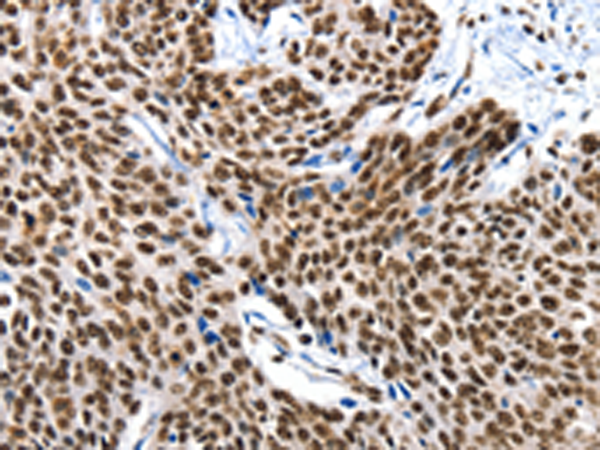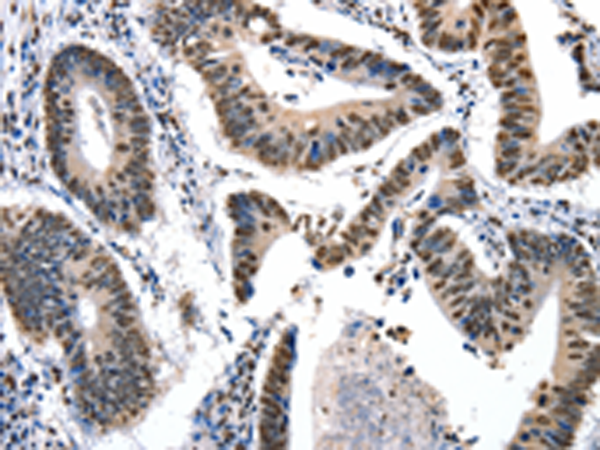


| WB | 1/500-1/2000 | Human,Mouse,Rat |
| IF | 咨询技术 | Human,Mouse,Rat |
| IHC | 1/25-1/100 | Human,Mouse,Rat |
| ICC | 技术咨询 | Human,Mouse,Rat |
| FCM | 咨询技术 | Human,Mouse,Rat |
| Elisa | 1/2000-1/5000 | Human,Mouse,Rat |
| Aliases | hK7, SCCE, PRSS6 |
| WB Predicted band size | 28 kDa |
| Host/Isotype | Rabbit IgG |
| Antibody Type | Primary antibody |
| Storage | Store at 4°C short term. Aliquot and store at -20°C long term. Avoid freeze/thaw cycles. |
| Species Reactivity | Human, Mouse |
| Immunogen | Fusion protein of human KLK7 |
| Formulation | Purified antibody in PBS with 0.05% sodium azide and 50% glycerol. |
+ +
以下是关于KLK7抗体的3-4篇代表性文献的简要总结(基于公开研究背景,部分信息可能需核实):
1. **文献名称**:*"Human tissue kallikrein 7: A novel serum biomarker for ovarian cancer"*
**作者**:Petraki CD, et al.
**摘要**:研究通过开发特异性KLK7抗体,检测到KLK7在卵巢癌患者血清和组织中显著高表达,提示其作为潜在生物标志物和预后评估工具的价值。
2. **文献名称**:*"Kallikrein 7 modulates barrier function in human epidermis through protease-activated receptor 2 activation"*
**作者**:Borgono CA, et al.
**摘要**:利用KLK7抗体阻断实验,发现KLK7通过激活PAR-2通路破坏皮肤屏障功能,可能参与炎症性皮肤病(如特应性皮炎)的发病机制。
3. **文献名称**:*"Immunohistochemical analysis of kallikrein-related peptidase 7 in pancreatic ductal adenocarcinoma"*
**作者**:Kyriakopoulou LG, et al.
**摘要**:研究使用KLK7特异性抗体进行免疫组化分析,发现KLK7在胰腺癌组织中异常表达,并与肿瘤侵袭性和患者生存率相关。
4. **文献名称**:*"Development of a monoclonal antibody against human kallikrein 7 for detection of proteolytic activity in stratum corneum"*
**作者**:Caubet C, et al.
**摘要**:报道了一种针对KLK7的单克隆抗体的开发,该抗体能够特异性识别角质层中KLK7的活性形式,用于研究其在皮肤脱屑过程中的作用。
(注:以上文献名称及摘要内容基于KLK7相关研究的典型方向概括,具体文献需通过学术数据库进一步检索确认。)
**Background of KLK7 Antibodies**
Kallikrein-related peptidase 7 (KLK7) is a serine protease within the tissue kallikrein family, encoded by the *KLK7* gene. It plays a critical role in skin desquamation by cleaving corneodesmosomal proteins, maintaining epidermal barrier function. KLK7 is also implicated in pathological processes, including inflammation, cancer progression, and metastasis, due to its ability to degrade extracellular matrix components and regulate signaling pathways. Overexpression of KLK7 has been observed in ovarian, breast, and skin cancers, correlating with poor prognosis.
KLK7 antibodies are immunological tools designed to detect, quantify, or inhibit KLK7 protein activity. These antibodies, often monoclonal or polyclonal, are utilized in techniques like Western blotting, immunohistochemistry (IHC), and enzyme-linked immunosorbent assays (ELISA) to study KLK7 expression patterns in tissues or biological fluids. Researchers employ KLK7 antibodies to explore its role in diseases, such as psoriasis, atopic dermatitis, and cancer, as well as its potential as a therapeutic target or diagnostic biomarker.
Recent studies focus on developing inhibitory antibodies to block KLK7’s proteolytic activity, aiming to mitigate its contribution to tumor invasion or inflammatory skin disorders. Additionally, KLK7 antibodies are critical in validating experimental models, such as 3D skin cultures or xenografts, to assess KLK7’s functional relevance. Ongoing research continues to unravel KLK7’s complex interactions in health and disease, driving innovation in antibody-based diagnostics and therapies.
×